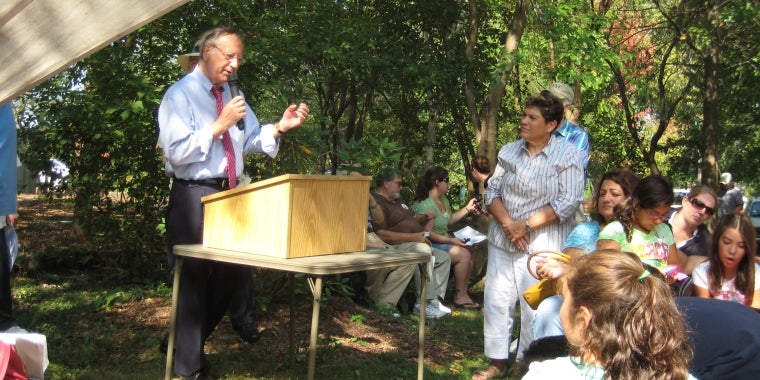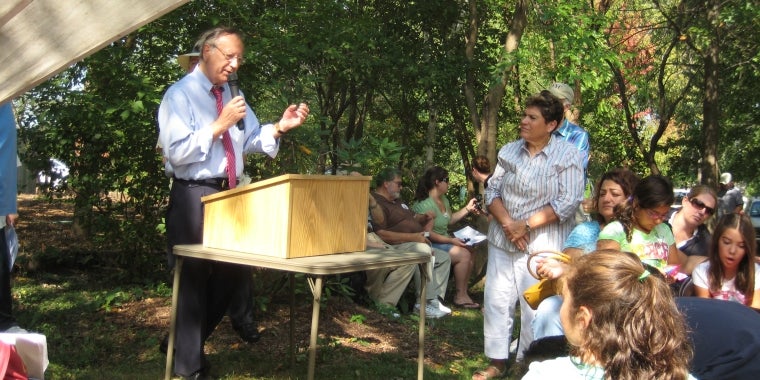
Padavan: Progress on Key Environmental Conservation and Alternative Energy Measures Made in 2008 Legislative Session
Frank Padavan
June 25, 2008
With the 2008 State Legislative Session concluded, New York State Senator Frank Padavan (Queens) announced today that significant progress has been achieved on a myriad of important environmental conservation and alternative energy bills.
“When all is said and done, the 2008 State Legislative Session will be remembered for the remarkable progress made on important legislative initiatives focused on environmental conservation and alternative and renewable energy,” Padavan said. “From the bipartisan legislative agreement to reform the state Brownfield program to providing property tax abatements for solar generating system in New York City and many other legislative measures, the state Legislature has delivered real results that will lead to a cleaner and greener New York.”
Senator Padavan was the sponsor and driving force in the state Legislature on legislation that will provide a four-year property tax abatement for the construction and installation of a solar generating system for class one (residential), class two (condominiums/cooperative apartments) and class four (commercial) properties within the City of New York.
The amount of the property tax abatement a taxpayer can receive depends on when the system is operational. If the solar electric generating system is in service before January 1, 2011 the amount of the property tax abatement would be 8 3/4 % of eligible expenditures in each of the four years of the compliance period. If the system is placed into service between January 1, 2011 and January 1, 2013, the amount of property tax abatement would be 5 percent over the four year period.
“With energy prices continuing to soar and with no certain end in sight, we must take the necessary steps to foster the use of alternative and renewable energy sources,” Padavan said. “This legislation provides incentives for New York City residents and businesses to invest in cleaner, efficient and cost effective solar power. This property tax abatement is essential and will allow City residents and businesses to help offset some of the investment associated with the construction and placement of solar panels on their property.”
The solar generating equipment property tax abatement is a key legislative initiative in Mayor Bloomberg’s PLANYC 2030. Another key initiative from PLANYC that passed the state Legislature is an amendment of the classification of obstruction of an intersection from a moving violation to a parking violation therefore allows all traffic enforcement agents to issues tickets. The legislation also increases the fine for “blocking the box” from $90 to $115.
The state Legislature also passed legislation that will provide a four-year City property tax abatement for green roof construction. This property tax abatement is a provision included in Mayor Bloomberg’s PLANYC environmental sustainability plan.
The 2008-09 State Budget invests a record level of funding of $255 million for the Environmental Protection Fund (EPF). This funding will allow the EPF to provide funding for essential environment programs including open space preservation, municipal recycling, pollution prevention, farmland protection and water pollution control.
Brownfields Reform
During the final days of the legislative session, a long awaited bipartisan legislative agreement was reached on comprehensive reforms to the state’s Brownfield Cleanup Program. The legislation, which passed by both houses of the state Legislature, will be instrumental in revitalizing contaminated sites across the state through financial incentives.
The brownfield cleanup reform bill will in certain instances double the current tax credit for site cleanup, up to 50 percent of cleanup costs. The bill will also limit redevelopment credits for non-manufacturing projects to $35 million or 3 times the cost of the site clean, whichever is less. For manufacturing projects the redevelopment credit is limited to $45 million or six times the cost, whichever is less.
Net Metering-Increasing Alternative Energy
The state Legislature also passed a package of bills that will increase the number of customers who can take part in net metering for renewable electric generating systems and expands current net metering laws for solar, wind and farm waste technologies Net metering allows a utility customer with an on-site electric generating system to send excess power that they generate back to the utility grid, receiving a credit on future electric bills.
Cancer Mapping Program
The state Legislature passed legislation that would require the Department of Health (DOH) and Department of Environmental Conservation (DEC) to collaborate and collect information from New Yorkers suffering from cancer and the potential reasons for that cancer. These factors could include employment history, genetics, environmental sources or pollution. All the information collected would be used by scientists and health professionals to research and draw conclusions about the causes of cancer clusters.
Additionally, the legislation requires the Health Science Board to issue a report within six months after the bill is signed into law. Following a public review, DOH will have three months to release a final report to the public on areas within the Cancer Mapping Project. The Cancer Maps would also be posted on DOH’s website for easy public access and review.
Plastic Bag Recycling
The state Legislature also passed legislation that would require stores to establish a recycling program for plastic bags used by consumers. Under the legislation, stores must also sell reusable bags and make all collection spots visible and keep records on their plastic bag recycling collections.
Business Tax Credit for Alternative Energy
In mid-May, the Senate passed legislation, co-sponsored by Senator Padavan that would establish a credit for businesses for alternative and renewable energy systems and generating equipment. The legislation provides a business tax credit for eligible solar and wind generating system equipment equal to fifty percent of qualified expenses incurred by a taxpayer. The legislation also provides a tax credit equal to 45 percent for qualified expenses related to eligible fuel cell electric generating equipment. Existing state law already contains provisions for a personal income tax credit for individuals who purchase solar energy technology for residential use. The legislation awaits action in the state Assembly.
“Each of these bills are perfect examples of legislative initiatives that serve as building blocks that are vital to our economic and environmental future,” Padavan said. “I am confident that the success we achieved this year will help bring about additional progress in the next legislative session.”
Share this Article or Press Release
Newsroom
Go to NewsroomPadavan Celebrates National Estuaries Day At APEC's Little Neck Bay Festival
September 28, 2010

Padavan Celebrates National Estuaries Day At APEC's Little Neck Bay Festival
September 28, 2010

